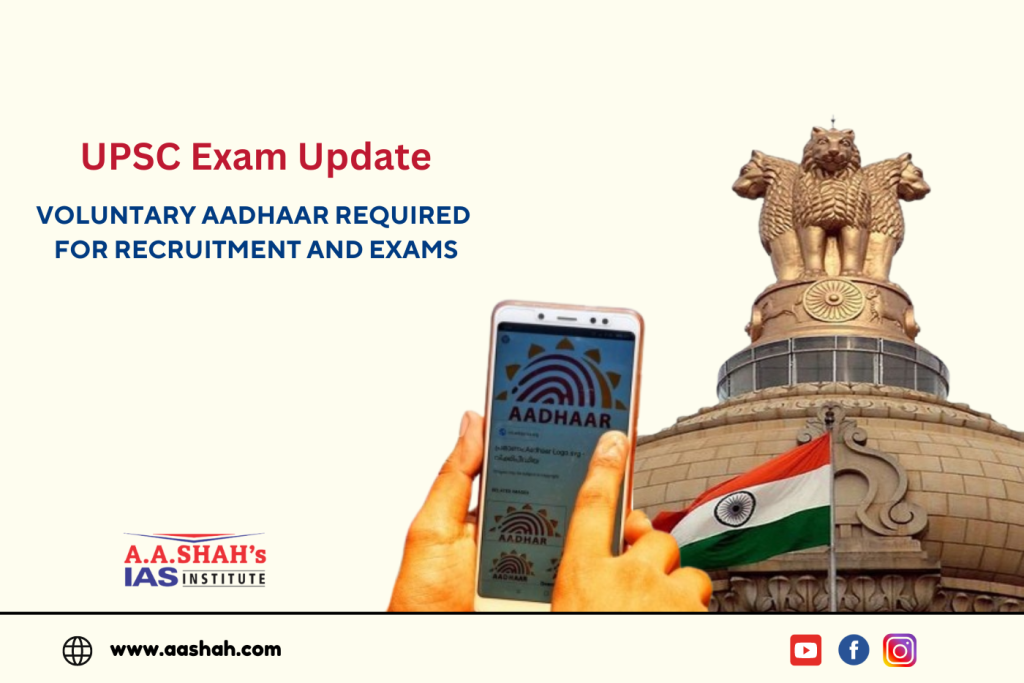
UPSC to Start Voluntary Aadhaar Authentication for Exams, Recruitment: A Step Towards Digitalization
Pooja Khedkar, a former IAS trainee, is currently embroiled in controversy over allegations of fraudulently securing her position in the
UPSC Civil Services Examination. The UPSC has taken strong actions against her, including cancelling her provisional selection and barring her from future exams. The allegations involve faking her identity to avail extra exam attempts. Despite these accusations, Pooja Khedkar has refuted the charges and argued that the UPSC lacks the authority to disqualify her after her selection as a probationer. The case has drawn significant attention, with legal
proceedings ongoing. Whether the defense taken by Pooja Khedkar shall hold water or not, it will be decided by the Court. But with intention to ensure
that no such incident happens in future, Personnel Department has issued a gazette notification, whereby it has allowed UPSC to perform Aadhar
authentication at the time of registration and during various stages of examination / recruitment.
Though UPSC has announced that it shall be voluntary for the time being it.
This being the case, UPSC has recently announced to go digital, by introducing Aadhar Authentication for Exams and recruitment processes. Though The Introduction:
The Union Public Service Commission (UPSC) has taken a significant step towards digitalization by introducing voluntary Aadhaar authentication for
exams and recruitment processes. This move aims to enhance the security and transparency of the examination process, while also reducing the risk of impersonation and fraud.
Benefits of Aadhaar Authentication:
- Enhanced Security: Aadhaar authentication adds an extra layer of security to the examination process, ensuring that only genuine candidates appear for the exams.
- Transparency: The use of Aadhaar authentication promotes transparency in the recruitment process, reducing the risk of malpractices and fraud.
- Efficient Verification: Aadhaar authentication enables quick and efficient verification of candidate identities, streamlining the examination process.
- Reduced Impersonation: Voluntary Aadhaar authentication minimizes the risk of impersonation, ensuring that candidates are who they claim to be.
How it Works:
- Candidate Registration: Candidates register for the exam, providing their Aadhaar number and other details.
- Aadhaar Authentication: Candidates undergo Aadhaar authentication at the examination center, verifying their identity.
- Verification: The UPSC verifies the candidate’s identity using Aadhaar data, ensuring authenticity.
Conclusion:
The introduction of voluntary Aadhaar authentication by UPSC marks a significant step towards digitalization and transparency in the
examination process. This move is expected to enhance the security and integrity of the recruitment process, while also improving the overall candidate experience.
FAQs:
1. Is Aadhaar authentication mandatory?
Ans: No, Aadhaar authentication is voluntary.
2. How does Aadhaar authentication enhance security?
Ans: Aadhaar authentication adds an extra layer of security, ensuring only genuine candidates appear for exams.
3. What are the benefits of Aadhaar authentication?
Ans: Enhanced security, transparency, efficient verification, and reduced impersonation.
Stay Updated:
For the latest updates on UPSC exams and recruitment processes, follow us on Youtube I Facebook I Instagram
